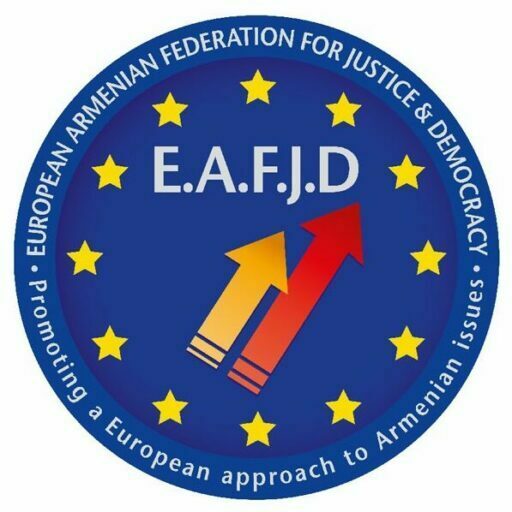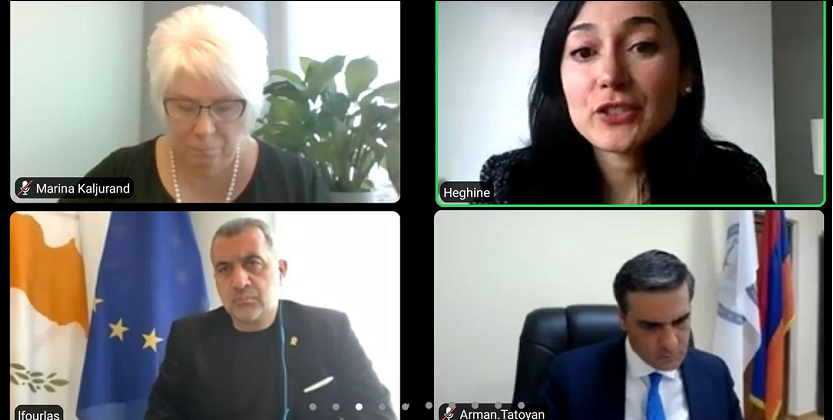Good evening, ladies and gentlemen. First of all, on behalf of the European Armenian Federation for Justice and Democracy (the EAFJD) – a European grassroots civil society organization with chapters in 13 EU member states, I would like to thank Mr. Fourlas for organizing this virtual conference on such an urgent human rights issue as that of the Armenian captives in Azerbaijan and for the invitation to take part in it. Indeed, we would also like thank Mrs. Kajlurand for her elaboration and for her commitment to resolving the issue, in her capacity as the Chair of the South Caucasus Delegation in the European Parliament.
As the legislative body of the EU, there is certainly a need for more active and tangible involvement of the European Parliament in this urgent humanitarian issue. Silence or inactivity concerning matters like this have an extremely painful price which is nothing less than human life and human dignity. These are both inviolable values and the fundamental pillars that the European Union and a Western society is built on. So, as a pan-European grassroots organization we hope that this virtual conference raises awareness about the pressing need to act and contributes to creating the necessary pressure on the Azerbaijani authorities in order immediately free all the Armenian captives. As a matter of fact, by keeping these people in captivity, Azerbaijan is violating one of the main points of the ceasefire statement of 9. November which stipulates the release of all the captives, detainees and prisoners of war. As we know, Azerbaijan signed this ceasefire statement to end the 44-day war in Nagorno Karabakh or Artsakh and is hence obliged to adhere to it.
It has been more than 5 months since the ceasefire statement was signed and there are still at least 188 Armenian captives in the prisons in Azerbaijan. Every minute of captivity in Azerbaijan exposes them to further danger, suffering and makes their families go through heart numbing agony. In fact, as a civil society organization, we are receiving letters from their family members, desperately reaching out for help and hoping for solidarity. Every single one of these captives is a beloved son, brother, father, daughter, friend and someone who is simply precious to their loved ones. Hence, keeping the captives is a prolongation of the war from the psychological perspective. It is the continuation of the destructive consequences of the war. Human beings, even if they are in captivity, cannot be used as an object of political trade-off, in order to elicit more gains. The Azerbaijani authorities must immediately stop this instrumentalization.
According to the report published by the Council of Europe’s torture prevention body in 2018 – the (CPT) “torture in Azerbaijan by police and other law enforcement agencies is “systemic and endemic”. The CPT documented “severe physical ill-treatment” of detainees in Azerbaijan. Now, if this is the case with the ethnic Azerbaijani detainees, considering the systemic Armenophobia Azerbaijan, it is not difficult to imagine, the suffering that the Armenian captives and prisoners of war are currently going through.
Recently, the Human Rights Watch (HRW) published several detailed reports as well as statements on the war crimes, torture and murder of the Armenian captives and POWs in Azerbaijan, based on the field work and interviews with some of the repatriated captives. According to the most recent statement of HRW, the Armenian captives were subjected to cruel and degrading treatment and torture. As a matter of fact, Azerbaijan’s treatment of the PoWs, is a serious breach of the Fourth Geneva Convention and constitutes a war crime.
There are at this stage at least 188 identified Armenian captives and prisoners of war in Azerbaijan. The European Court of Human Rights (ECHR) notified the Committee of Ministers on the interim measures against Azerbaijan (related to the cases of 183 Armenian captives), due to the Azerbaijani Government’s failure to respect the time-limits set by the ECHR for the submission of exact information on the Armenian captives and considering the rather general and limited information provided by them. The Azerbaijani authorities are also creating difficulties for the International Committee of the Red Cross (ICRC) and preventing the ICRC from carrying out its mandate of visiting the Armenian prisoners of war in Azerbaijan and ensuring that their rights enshrined in the Geneva convention are being upheld. I still stop here when it comes to the legal aspects since Mr. Tatoyan – the Ombudsman of Armenia , will elaborate on this much better than I do.
But I would like to emphasize that as a civil society organization, the driving force of the EAFJD are citizens in 13 Members states of the European Union. They are devoted citizens of their countries, be it France , Cyprus, Greece, Sweden, Bulgaria or many others. In the meanwhile, they have strong emotional ties with the Republic of Armenia, Nagorno Karabakh/Artsakh and cherish this connection very much. Many of these people are the grandchildren or great grandchildren of the survivors of the Armenian Genocide in Ottoman Turkey, who over a very short period of time have become highly integrated and successful citizens of their respective country, contributing to its prosperity.
By its nature, our organization and its members as EU citizens rely on democracy and a certain sense of justice of the political leadership in Europe. As European citizens our members believe that, as often stated by the political leadership, human rights and standing up for these inalienable rights are a core value of the European Union.
Several Parliaments of the EU member states, such as those in the Netherlands, Slovakia, Latvia, the Czech Republic and Belgium, have adopted resolutions, calling on Azerbaijan to immediately release the Armenian captives and to organize their return home. The European External Action Service (EEAS) has also issued a statement. But overall, in particular on the level of the governments in the EU we have witnessed silence. The silence and the rather passive stance of governments on the European level concerning a humanitarian issue such as the release of the prisoners of war, has been disheartening for the Armenian diaspora across Europe and in fact anyone who cares about this issue and about human dignity.
We are certainly aware of all the challenges the European Union is facing, the difficulty of having a common position concerning foreign policy because of the different political and economic interests of the EU member states. Nevertheless, there has to be a compass and foundation of a solid policy, also when it comes to foreign policy. A foundation which cannot be compromised not only when it comes to words, but also by actions.
The bigger the gap is between words and actions, the more problematic it becomes for the credibility of the European Union, both from the perspective of its own citizens as well as for external actors. The EU’s fragility in this sense is unfortunately being abused first and foremost by authoritarian regimes.
It is painful to witness the European Union and its representatives on the highest level being publicly and demonstratively disrespected by authoritarian leaders. Yet, we all know that that this disrespect is not directed at the individual politicians of the European Union but rather at the value system they are expected to represent. It is painful to watch authoritarian leaders such as Ilham Aliyev and Regep Tayip Erdogan feel justified in their firm belief that the human rights have little value and crumble in the face of calculated economic interests and brutal demonstration of military power. It is not a secret and this has been publicly stated by the Human Rights Watch, the French President Emmanuel Macron that Azerbaijan was massively supported by Turkey during the 44 day war in Nagorno Karabakh, both by bringing paid terrorist fighters form the Middle East as well as by providing with destructive drones and military know-how.
Both Azerbaijan and Armenian are members of the EU Eastern Partnership program. So, Europe can and has to do better, also for the sake of its own credibility, strength and viability. We do hope that the European Parliament as an entity finally also expresses its position concerning the Armenian captives and calls on Azerbaijan to immediately release the Armenian captives and prisoners of war.
Heghine EVINYAN


